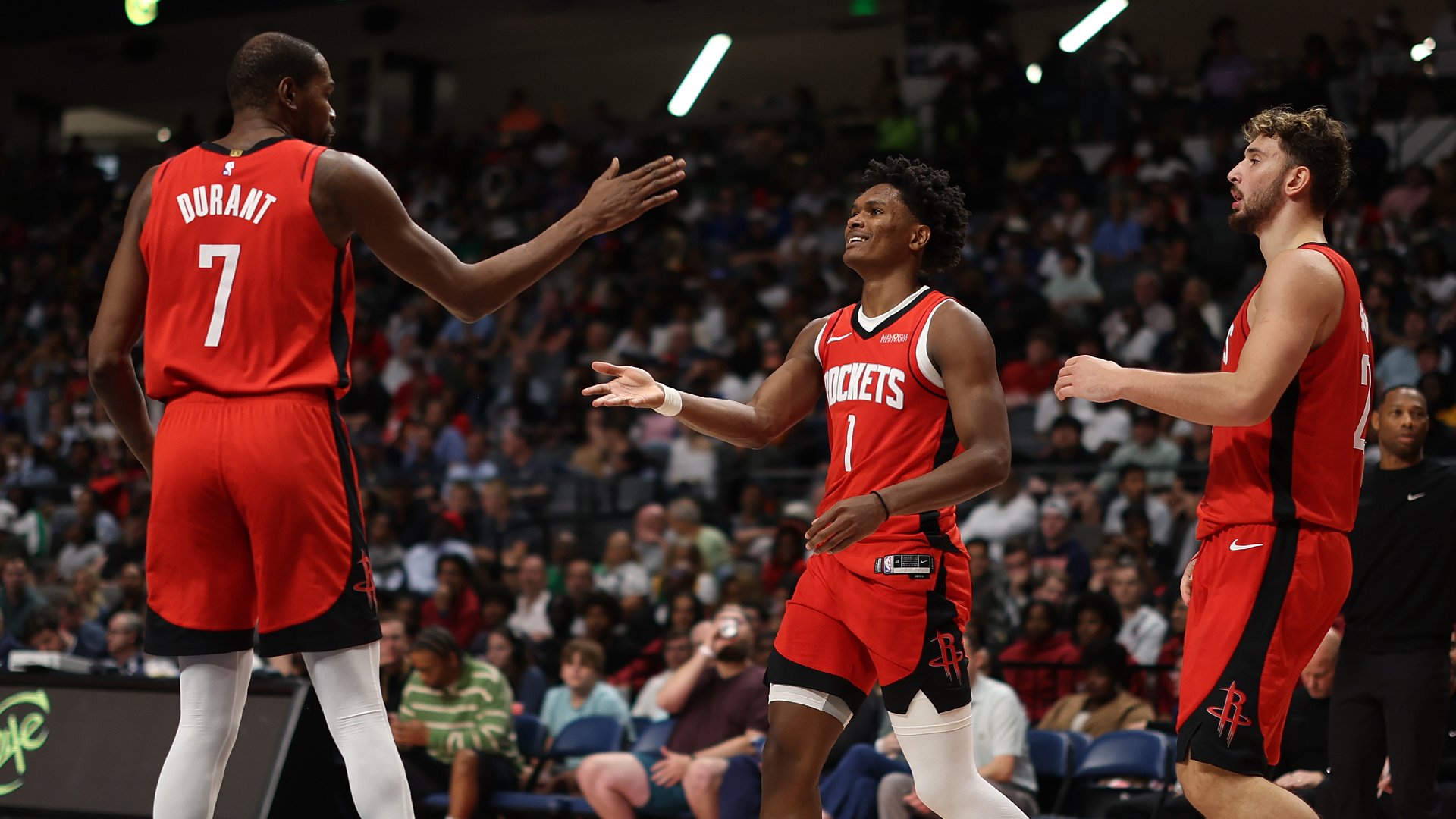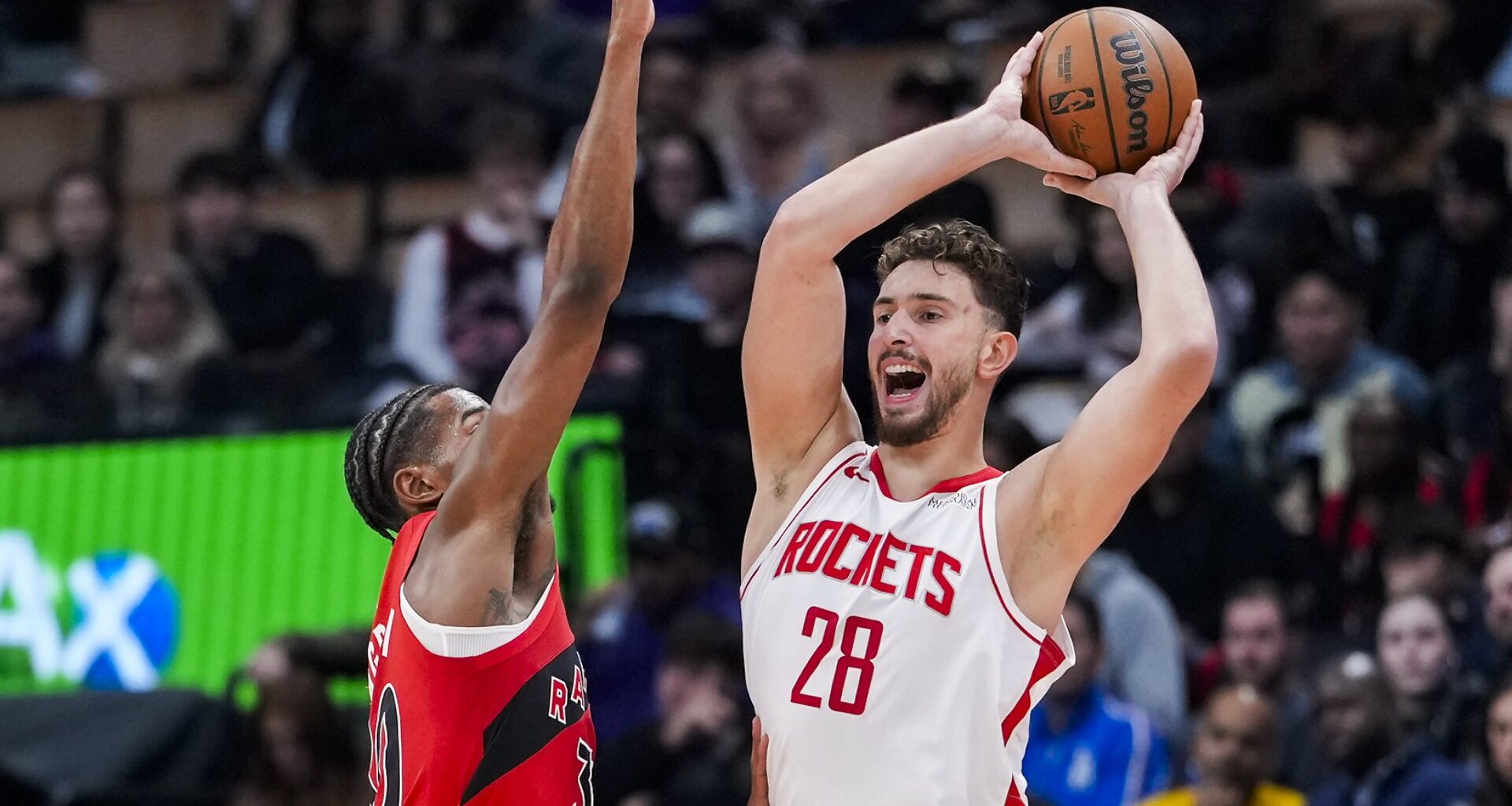
(From left) Kevin Durant, Amen Thompson and Alperen Sengun are keying Houston’s hot start to 2025-26.
The Houston Rockets lost their first two games by a total of five points. Since then, they’ve run off five straight wins by an average of 19.2.
The Rockets have seen significant statistical improvement for the third straight season. Thus far, Kevin Durant hasn’t had to do too much, and Fred VanVleet hasn’t been missed.
There are some unsustainable elements to the Rockets’ top-ranked offense, but Houston has the look of a contender.
Here are some notes, numbers and film as the Rockets put their five-game winning streak on the line in San Antonio on Friday (7:30 p.m. ET, Prime Video)…
1. No movement necessary
The Indiana Pacers’ run to the 2025 NBA Finals was a lesson that an offense can thrive with relentless ball and player movement.
Houston’s first seven games are a lesson that an offense can thrive with very little ball and player movement.
The Rockets have the No. 1 offense in the league, having scored 122.4 points per 100 possessions, 1.9 more than any other team. Yet they rank last in both ball movement (passes per 24 minutes of possession) and player movement (miles traveled per 24 minutes of possession).
Fewest passes per 24 minutes of possession
Team
Miles/24
Rank
Passes/24
Houston
9.3
30
303
L.A. Lakers
9.9
27
306
LA Clippers
9.4
29
308
Oklahoma City
10.4
16
308
Charlotte
10.6
11
311
Miles/24 = Miles traveled on offense per 24 minutes of possession
Passes/24 = Passes per 24 minutes of possession
via Second Spectrum tracking
It’s like the Rockets have returned to the James Harden era. Their 9.3 miles traveled per 24 minutes of possession would be the fewest for any team in the 13 seasons of tracking data.
Many Houston possessions are four guys standing around while the fifth goes to work. According to tracking data, the Rockets lead the league with 30.5 isolations per 100 possessions, with Alperen Sengun ranking eighth among individuals at 15.9 per 100, up from 10.2 per 100 last season.

It’s not that the Rockets aren’t sharing the ball. They’ve recorded assists on 60.3% of their field goals, a rate that ranks 22nd and is up from their 54.9% (30th) last season.
They just use one-on-one situations to gain advantages and generate layups or open shots.


The Rockets have been better able to take advantage of double-teams with Tari Eason and Josh Okogie combining to shoot an unsustainable 31-for-57 (54%) from 3-point range. But they also depend less on 3-point shooting than most teams. Only 34.1% of their shots, the league’s second-lowest rate, have come from beyond the arc.
2. Second chances mean a lot
The Rockets do depend on second chances. Through seven games, they’ve retained 40.2% of available offensive boards, which would be the highest rate for any team in the 30 seasons for which we have play-by-play data.
If we subtracted second-chance points and just looked at initial offense, the Rockets would rank 10th (102.1 points scored per 100 possessions), 4.6 fewer than the top-ranked Milwaukee Bucks. But with second-chance points included, the Rockets rank first and the Bucks rank ninth.
Playing two bigs together is generally better for defense than for offense, but the Rockets have scored 128.8 points per 100 possessions in 136 total minutes with Alperen Sengun on the floor with either Steven Adams or Clint Capela, compared to 122.8 (still very efficient) in 121 minutes with Sengun at center.
Much of that success is offensive rebounds, with the Rockets retaining more than 44% of available offensive boards when Sengun has shared the floor with either Adams or Capela.
3. Big advantage at the line
The rebounding has helped the Rockets lead the league in offensive efficiency despite ranking 10th in effective field goal percentage, the most important of the four factors on offense. Another boost: free throws. The Rockets rank fourth in free-throw rate, averaging 35.9 attempts per 100 shots from the field.
Free throws, or the lack thereof, have also been critical on the other end of the floor. The Rockets rank first in opponent free-throw rate (22.8 attempts per 100 shots from the field), having seen the biggest drop from last season, when they ranked 19th (24.5 per 100). Free throws are way up league-wide, and the LA Clippers are the only other team that has seen a drop in opponent rate.
Under coach Ime Udoka, the Rockets have always taken pride in being a physical defensive team. But it might be helpful that their most physical defender — Dillon Brooks (fourth in total fouls last season) — now plays for the Phoenix Suns. Sengun (ninth in total fouls last season) has also seen a drop from 3.1 to 2.8 fouls per 36 minutes. (He’s actually seen a drop in fouls per 36 every year since his rookie season.)
Drawing fouls on one end of the floor and avoiding them on the other has the Rockets outscoring their opponents by 9.1 points per game at the free throw line, which would be the biggest differential in (at least) the last 56 years.
4. Playing more zone than anybody
Another reason that explains why the Rockets may be fouling less is the increased usage of zone defense. According to Synergy tracking, Houston has played zone on 18.6% of defensive possessions.
That …
Is almost double the rate of any other team this season. The Miami Heat rank second at 9.7%.
Would be the second-highest rate in 18 seasons of Synergy tracking.
Is almost four times the Rockets’ rate (5%, fourth most) last season.
The zone gave up some open 3s and an alley-oop dunk in Memphis on Wednesday. Shai Gilgeous-Alexander was also able to get Reed Sheppard isolated when the Rockets played zone on opening night. But overall, opponents have scored less efficiently against the Rockets’ zone than they have against man-to-man defense.
It allows the Rockets to keep their bigs near the basket to protect the rim and force tougher shots. And the Rockets have the collective length and athleticism to rotate on the pass and somewhat prevent in-rhythm looks on the perimeter.

It’s still early, and some of those historical numbers will probably become less historical as 2025-26 continues.
But the Rockets are a different team than they were last season … and not just because they traded for Durant.
* * *
John Schuhmann has covered the NBA for more than 20 years. You can e-mail him here, find his archive here and follow him on Bluesky.

